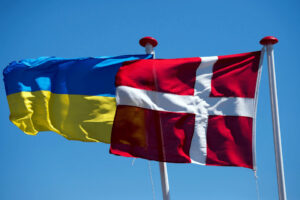
China has taken a new step in the race for leadership in future communications technologies. Scientists from Peking University and City University of Hong Kong have developed the world’s first universal 6G chip, which is capable of delivering data transfer speeds of over 100 Gbps and operating at any frequency in the range from 0.5 to 115 GHz. This was reported by the South China Morning Post and Interesting Engineering, citing a publication in Nature magazine.
The finger-sized device (11×1.7 mm) allows you to download, for example, a 50 GB 8K video in a matter of seconds.
The modem uses a photon-electron architecture, which allows different frequency bands to be combined into a single system.
The development solves a key problem for future 6G networks: spectrum fragmentation. Currently, equipment is created separately for “low,” “medium,” and “millimeter” frequencies, which complicates implementation. The new chip is universal and can be used both in rural areas (for low-frequency coverage) and in megacities (for ultra-fast connections at high frequencies).
Prototypes that transmitted data at a speed of 100 Gbit/s over limited distances were previously demonstrated in Japan, and an experimental 6G network was launched in China in 2024. However, it is the Chinese universal modem that has covered the entire frequency range for the first time, making it unique.
The next step is to integrate the technology into compact USB-format modules and adapt it for smartphones, base stations, and Internet of Things devices. This will bring us closer to the mass adoption of 6G, which experts expect in the 2030s.
China is cementing its leadership in 6G development by offering the world a unique solution that could change the landscape of mobile technology. The breakthrough universal modem opens up opportunities for a digital revolution — from medicine to the entertainment industry.

The Federal Appeals Court ruled that most of Donald Trump’s tariffs exceed his powers as president.
The so-called reciprocal tariffs imposed on almost all countries that trade with the US are illegal, the US Appeals Court ruled on Friday.
The ruling upholds a May decision by the International Trade Court, which also rejected Trump’s argument that his global tariffs were permitted under the International Emergency Economic Powers Act.
The court did not strike down the tariffs, but said they would remain in effect until mid-October, setting the stage for further legal action in the US Supreme Court.
Much remains unknown, but here is what we understand at this point about the court’s decision and what it could mean for the US president’s flagship policy.
In its 7-4 decision, the appeals court upheld the lower court’s conclusion that President Trump did not have the authority to impose global tariffs.
This was mainly because of the law Trump used to justify his policy, the International Emergency Economic Powers Act (IEEPA), which, according to the judges, does not give “the power to impose tariffs, duties, etc., or the power to levy taxes.”
The US Court of Appeals rejected Trump’s argument that the tariffs were permitted under his emergency economic powers, calling the levies “invalid because they violate the law.”
Trump immediately rejected the ruling, writing on Truth Social hours after it was handed down that the appeals court was “very biased” and that the ruling was a ‘disaster’ for the country.
“If this ruling stands, it will literally destroy the United States of America,” he wrote.
This law, passed decades ago and repeatedly invoked by Trump during both of his terms in office, gives the US president significant powers to respond to emergencies within the country or serious threats from abroad.
The 1977 law states that the president may use a range of economic levers “to counter any unusual and extraordinary threat that originates wholly or in substantial part outside the United States and is directed against the national security, foreign policy, or economy.”
It was used by both President Barack Obama and Joe Biden, who invoked the law to impose sanctions against Russia after its illegal annexation of Crimea in 2014, and then again after its full-scale invasion of Ukraine eight years later.
However, the appeals court said in its ruling that the emergency law “does not grant the president broad authority to impose tariffs.”
The IEEPA “does not mention tariffs (or any synonyms thereof) and does not contain procedural safeguards that would clearly limit the president’s authority to impose tariffs,” they said.
Trump, in announcing the imposition of global tariffs, argued that trade imbalances were damaging US national security and therefore constituted a national emergency.
However, the court ruled that imposing tariffs is not within the president’s authority and that “the power to dispose of public funds (including the power to levy taxes) belongs to Congress.”
In addition to being a significant blow to the central point of President Trump’s agenda — tariffs — the federal appeals court’s decision could have a direct impact on the US economy and cause a chain reaction in global markets.
“Businesses will be subject to uncertainty,” said Dr. Linda Yue, an economist at Oxford University and London Business School, on BBC Today.
While countries wait to see if the Supreme Court will take up the case, which seems likely, they may decide to suspend business with the US.
If that happens, Dr. Yue said, it could “weaken economic activity.”
There are also significant implications that could play out in the political arena.
For example, if the Supreme Court overturns the federal appeals court’s decision and sides with the Trump administration, it could set a precedent that encourages the president to use the IEEPA more aggressively than he has done so far.
The case will likely be referred to the highest court in the US, as Trump announced on Truth Social.
“Our indifferent and short-sighted politicians have allowed tariffs to be used against us,” Trump wrote. “Now, with the help of the US Supreme Court, we will use them for the benefit of our nation and make America rich, strong, and powerful again!”
The conservative majority in the US Supreme Court could potentially increase the likelihood that it will support the president’s position.
Six of the nine justices were appointed by Republican presidents, including three by Trump during his first term in the White House.
However, the court is also more critical of presidents when it believes they exceed their authority on issues not approved by Congress.
For example, during Joe Biden’s presidency, the court expanded what it called the “major question doctrine” to invalidate Democrats’ attempts to use existing laws to limit greenhouse gas emissions from power plants and forgive the student loan debt of millions of Americans.
The federal appeals court split 7-4 in its ruling that nearly all of Trump’s tariffs are illegal. It has now given the US administration until mid-October to appeal to the US Supreme Court in a case that has implications for both the US economy and its trade relations with the rest of the world.
If the Supreme Court upholds the ruling, it could cause uncertainty in financial markets.
Questions will arise about whether the US will have to return the billions of dollars it has collected in import duties on products from countries that have paid them over the past few months.
It could also call into question whether major economies, including the UK, Japan, and South Korea, will be bound by the individual trade deals they have negotiated with the US before the August deadline. Other trade deals currently under negotiation could also be thrown into chaos.
If the appeals court ruling is upheld, it will also deal a huge blow to Trump’s political authority and his reputation as a negotiator. But if it is overturned by the Supreme Court, it will have the opposite effect.
This decision concerns Trump’s “reciprocal tariffs,” which include a set of different rates for most countries in the world, including other taxes imposed on China, Mexico, and Canada.
These import duties on almost all goods from almost all countries with which the US trades will remain in effect until mid-October.
After October 14, they will no longer be in effect, the appeals court said.
Separately, tariffs on steel, aluminum, and copper, which were imposed under other presidential powers, will remain in effect and will not be affected by the court’s decision.

Turkish Foreign Minister Hakan Fidan announced at an emergency parliamentary session that Turkey was severing all economic and trade ties with Israel. He also confirmed that Turkish airspace would be closed to government and arms flights from Israel and that Israeli ships would be banned from entering Turkish ports. Turkish ships will also no longer be able to enter Israeli ports.
Fidan stressed that the decision itself is already being partially implemented: Turkish port authorities have begun to require ships to confirm that they are not affiliated with Israel and are not transporting weapons.
Earlier, in May 2024, Ankara suspended direct trade relations with Tel Aviv in response to its actions in Gaza.
In 2023, trade between the countries reached $7 billion. Turkey accuses Israel of genocide in Gaza, which Israel denies. Ankara has also begun preparations for humanitarian flights to deliver aid to Palestine. Fidan made this announcement, emphasizing that the president’s approval has already been obtained and that they are now waiting for permission from Jordan.
Turkey is making a decisive geopolitical shift, completely severing economic and logistical ties with Israel. The actions cover the air, sea, and trade sectors and deepen the rift in relations between the countries, highlighting the growing tensions throughout the region.

Danish Defense Minister Troels Lund Poulsen said that Ukrainian defense companies may soon start production in Denmark.
“The second thing I will mention today is what could be called the ‘Danish model 2.0’. I hope that in a few weeks we will invite the first Ukrainian defense company to start production here in Denmark, in a safe environment,” he said during a briefing with EU foreign policy chief Kaja Kallas on Friday.
Poulsen noted that he expects other Ukrainian defense companies to join the process later this year. “And I believe that this will also be a way to provide even more support to Ukraine,” he stressed.
The minister also said that he discussed this initiative during his visit to Kyiv on Sunday. “During this visit, I had the opportunity to talk to both President Zelensky and the new Minister of Defense Denys Shmyhal about the prospects of inviting Ukrainian defense companies to start production here in Denmark. And they fully support this idea,” he said.

Canada’s economy contracted by 1.6% year-on-year in the second quarter, according to the country’s statistics agency. Analysts polled by Trading Economics had expected a more moderate decline of 0.6%. Compared to the previous quarter, Canadian GDP fell by 0.4%.
According to revised data, in the first quarter, the Canadian economy fell by 2% year-on-year but rose by 0.5% quarter-on-quarter. Canadian exports fell by 7.5% in April-June, while imports fell by 1.3%.
Meanwhile, consumer spending rose by 1.1% and government spending by 1.8%.
Earlier, the Experts Club information and analytical center made a video analysis of the prospects for the Ukrainian and global economies. For more details, see the video — https://youtu.be/kQsH3lUvMKo?si=F4IOLdLuVbYmEh5P

A US appeals court on Friday ruled that most of the tariffs imposed by Donald Trump were illegal, undermining the use of these levies as a key tool of international economic policy, Reuters reports.
The court allowed the tariffs to remain in effect until October 14 so that the Trump administration could appeal to the US Supreme Court.
“The decision comes amid a legal battle over the independence of the Federal Reserve, which is also likely to reach the Supreme Court, creating an unprecedented legal confrontation this year over Trump’s economic policy,” the report said.
US President Donald Trump criticized the verdict, saying it was accepted: “ALL TARIFFS ARE STILL IN EFFECT! Today, the highly partisan Court of Appeals wrongly ruled that our tariffs should be canceled, but they know that the United States of America will ultimately prevail. If these tariffs ever disappear, it will be a complete disaster for the country. It will make us financially weak, and we must be strong… Now, with the help of the US Supreme Court, we will use them to benefit our nation and make America rich, strong, and powerful again!” Trump wrote on Truth Social.
According to the publication, in a 7-4 decision, the court considered the legality of the “reciprocal” tariffs imposed by Trump in April as part of the trade war, as well as separate tariffs against China, Canada, and Mexico imposed in February.
The court noted that the International Emergency Economic Powers Act (IEEPA), to which Trump referred, does not provide the president with the direct right to impose tariffs. “It is unlikely that Congress, in enacting the IEEPA, intended to depart from its previous practice and grant the president unlimited authority to impose tariffs,” the document states.